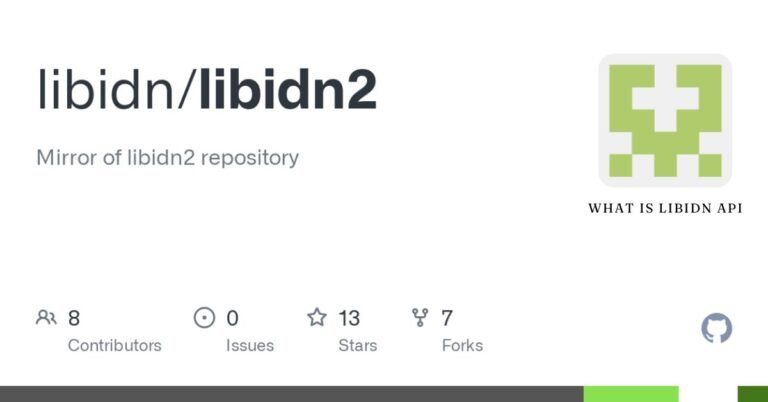Introduction
In the modern digital landscape, domain name processing plays a crucial role in ensuring smooth internet functionality across different languages and character sets. But what is Libidn API, and why is it an essential tool for developers and network administrators?
The Libidn API efficiently handles internationalized domain names (IDN) by converting Unicode characters into ASCII-compatible encoding (ACE). As an open-source library, it streamlines domain name processing, ensuring seamless compatibility with DNS and networking protocols. This conversion is necessary because domain name systems (DNS) and networking protocols only recognize ASCII characters.
With the increasing globalization of the internet, many domain names include non-Latin characters, such as 北京大学.cn or münchen.de. The Libidn API ensures these domain names can be processed correctly by converting them into Punycode, a standardized ASCII representation.
This article provides a detailed guide to the Libidn API, covering its key features, applications, benefits, and comparison with other alternatives. By the end, you will understand why this library is a vital tool for handling international domain names efficiently.
Key Features and Functionality
It efficiently manages and converts internationalized domain names (IDN) to ensure global networks communicate seamlessly. Here are its key features:
1. Support for IDNA 2003 and IDNA 2008 Standards
It supports both IDNA 2003 and IDNA 2008, two standards governing how internationalized domain names are encoded and interpreted.
- IDNA 2003 was the first widely adopted standard, ensuring that non-ASCII characters could be converted into a recognizable ASCII format.
- IDNA 2008 introduced refinements, addressing issues such as case mapping, invalid character detection, and better handling of symbols and digits.
By supporting both versions, Libidn API provides compatibility with legacy systems while enabling developers to adopt the latest domain name encoding techniques.
2. Unicode String Processing and Normalization
One of the major challenges in handling internationalized domain names is Unicode normalization. Different users may input domain names in various formats, leading to inconsistencies.
Libidn API includes tools for:
- Case folding (converting uppercase letters to lowercase for uniformity).
- Normalization (removing redundant Unicode characters).
- Validation (ensuring a domain name follows IDNA standards and contains no restricted characters).
These functions ensure that domain names are stored and processed in a consistent and secure manner.
3. Punycode Encoding for DNS Compatibility
The Domain Name System (DNS) does not support non-ASCII characters. To bridge this gap, Libidn API uses Punycode, an encoding technique that converts Unicode characters into ASCII-compatible encoding (ACE).
For example:
- The Unicode domain
münchen.deconverts toxn--mnchen-3ya.de. - The Chinese domain
北京大学.cnbecomesxn--1lq90i.cn.
This conversion ensures that international domain names can be processed by DNS resolvers without issues.
4. Security Measures and Phishing Protection
Internationalized domain names introduce a security risk known as homograph attacks. Attackers exploit visually similar Unicode characters to create fraudulent websites, such as:
раypal.com(using Cyrillic characters) instead ofpaypal.com.
Libidn API includes built-in security mechanisms to detect and block such deceptive domain names, making it a valuable tool for cybersecurity applications.
5. Open-Source and Cross-Platform Compatibility
Libidn API is available under the GNU Lesser General Public License (LGPL), meaning it is free to use and modify. It supports multiple operating systems, including:
- Linux and UNIX-based systems (Ubuntu, Debian, Fedora).
- macOS (via Homebrew).
- Windows (using compatibility layers like MinGW or Cygwin).
This broad compatibility makes Libidn API a flexible choice for developers working across different platforms.
Why Is Libidn API Important? Key Use Cases
The growing internationalization of the internet has made Libidn API a critical tool for handling multilingual domain names. Here are some key areas where it plays an essential role:
1. Web Browsers and URL Processing
Modern web browsers like Google Chrome, Mozilla Firefox, and Safari rely on Libidn API to handle internationalized URLs. When users enter non-Latin domain names, the browser converts them into Punycode before sending DNS requests.
Without Libidn API, web browsers would fail to process non-ASCII domain names, limiting global accessibility.
2. Email Services and Domain Validation
Email servers use Libidn API to process and validate domain names in email addresses. For example:
info@bücher.comis automatically converted toinfo@xn--bcher-kva.comto ensure proper email delivery.
By implementing it, email providers can support multilingual email addresses, preventing errors and improving accessibility.
3. Cybersecurity and Fraud Prevention
Phishing attacks using homograph domains pose a serious risk to online users. Cybersecurity firms integrate Libidn API into their security software to detect deceptive domain names and prevent users from visiting fraudulent websites.
By analyzing Unicode-to-ASCII conversions, security tools can identify and block malicious domains before they cause harm.
4. DNS Resolvers and Networking
DNS servers and network tools require Libidn API to handle domain name resolutions efficiently. It translates non-ASCII domain names into ASCII-compatible encoding, ensuring seamless DNS query execution.
Without Libidn API, internationalized domain names would fail to resolve correctly, leading to connectivity issues.
5. Software Localization and Global Applications
Developers working on global applications use this to ensure that domain names are properly encoded and displayed in different languages and scripts. This enhances user experience and ensures seamless integration across multilingual software solutions.
Comparison: Libidn API vs. Alternative Libraries
| Feature | Libidn API | ICU (International Components for Unicode) | GNU Libunistring |
|---|---|---|---|
| IDNA 2003/2008 Support | ✅ | ✅ | ❌ |
| Punycode Encoding | ✅ | ✅ | ✅ |
| Security Checks | ✅ | ❌ | ❌ |
| Open Source | ✅ | ✅ | ✅ |
| Cross-Platform | ✅ | ✅ | ✅ |
Why Choose?
While ICU (International Components for Unicode) is a strong alternative, It offers better security features and official GNU support. It is widely used in networking, email services, and cybersecurity applications, making it a preferred choice for IDN processing.
Conclusion
It efficiently processes, encodes, and validates Unicode-based domains, ensuring seamless handling of internationalized domain names. Web browsers, email services, cybersecurity tools, and DNS resolvers widely use this library to support global internet communication.
By supporting IDNA 2003 and IDNA 2008 standards, providing Punycode conversion, and implementing security checks against homograph attacks, Libidn API ensures safe and reliable domain name processing.
For developers and system administrators working on networking, cybersecurity, or multilingual applications, it is a must-have tool to guarantee seamless international domain compatibility.

